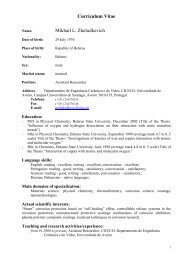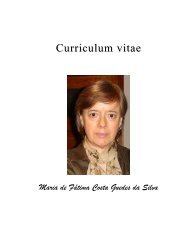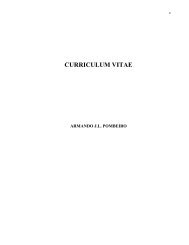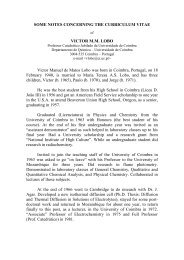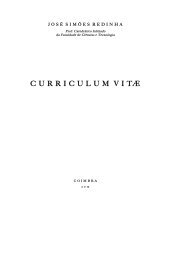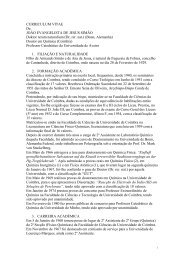XII Iberian Meeting of Electrochemistry XVI Meeting of the ...
XII Iberian Meeting of Electrochemistry XVI Meeting of the ...
XII Iberian Meeting of Electrochemistry XVI Meeting of the ...
Create successful ePaper yourself
Turn your PDF publications into a flip-book with our unique Google optimized e-Paper software.
<strong>XII</strong> <strong>Iberian</strong> <strong>Meeting</strong> <strong>of</strong> <strong>Electrochemistry</strong> & <strong>XVI</strong> <strong>Meeting</strong> <strong>of</strong> <strong>the</strong> Portuguese Electrochemical Society PE 10<br />
Investigation <strong>of</strong> 4-dimethoxymethyl- and 4-formyl-substituted<br />
1,4-dihydropyridine redox reactions.<br />
Anna Lielpetere, Inguna Goba, Baiba Turovska<br />
Latvian Institute <strong>of</strong> Organic Syn<strong>the</strong>sis, Aizkraukles 21, Riga, Latvia<br />
anna.lielpetere@gmail.com<br />
A little attention has yet been paid to <strong>the</strong> chemistry <strong>of</strong> formyl-substituted<br />
dihydropyridines [1,2] and <strong>the</strong>re are no electrochemical investigations <strong>of</strong> <strong>the</strong>m. In <strong>the</strong><br />
work <strong>the</strong> syn<strong>the</strong>sis and anodic oxidation <strong>of</strong> symmetrical and asymmetrical substituted<br />
1,4-DHP bearing chemically active formyl- or its protective acetal group has been<br />
studied. In acetonitrile <strong>the</strong> anodic oxidation <strong>of</strong><br />
H R<br />
H R<br />
X<br />
X<br />
Y<br />
X <strong>the</strong> studied compounds proceed in one<br />
irreversible step Figure 1, Figure 2. During <strong>the</strong><br />
H C N C H H 3<br />
3<br />
3 C N C H 3<br />
controlled potential electrolysis all studied<br />
H<br />
H<br />
compounds lost <strong>the</strong> substituent at C-4, while <strong>the</strong><br />
X = C N, C O C H 3 , C O O C H 3 X = C O C H 3 , C O O C H 3 ; Y = C N<br />
products <strong>of</strong> <strong>the</strong>ir chemical oxidation<br />
R = C H(O C H 3 ) 2 , C H O R = C H(O C H 3 ) 2 , C H O<br />
(2,3-dicyano-5,6-dichloro-p-benzoquinone) were<br />
corresponding 4-substituted pyridines.<br />
N C<br />
H 3 C O<br />
H<br />
O C H 3<br />
C H<br />
C O C H 3<br />
-e<br />
H 3 C N C H 3<br />
H<br />
H 3 C O O C H 3<br />
H C H<br />
H<br />
N C<br />
C O C H 3 N C<br />
C O C H 3<br />
. + +<br />
H 3 C N C H 3<br />
H 3 C N C H 3<br />
H<br />
Fig. 1. Anodic oxidation <strong>of</strong> 1,4-DHP<br />
Fig. 2. Anodic oxidation <strong>of</strong> 1,4-DHP<br />
in MeCN/0.1 M NaClO 4 in MeCN/0.1 M NaClO 4<br />
H<br />
ClO 4<br />
-<br />
N C<br />
H 3 C<br />
H<br />
. +<br />
N<br />
H<br />
O<br />
C H<br />
C O C H 3<br />
.. ..<br />
C H 3<br />
-e<br />
N C<br />
H 3 C<br />
H<br />
N<br />
H<br />
O<br />
C H<br />
C O C H 3<br />
C H 3<br />
H 3 C O O C H 3<br />
H C H<br />
N C<br />
C O C H 3<br />
..<br />
H 3 C N C H 3<br />
H<br />
N C<br />
H 3 C<br />
O<br />
H C H<br />
C O C H 3<br />
..<br />
N C H 3<br />
H<br />
4-Formyl-substituted 1,4-DHP are stable compounds at <strong>the</strong> room temperature, while in<br />
<strong>the</strong> solution aldehyde group at C-4 in dihydropyridine molecule could easy be oxidized<br />
to <strong>the</strong> acid or reduced with subsequent intramolecular condensation with <strong>the</strong> substituent<br />
at C-3 or C-5.<br />
Acknowledgments: We are grateful to <strong>the</strong> Latvian Science Foundation (Grant 2010_09.1558) for<br />
<strong>the</strong>ir support <strong>of</strong> this research.<br />
References<br />
[1] Grau M. A., Illescas B., Martinez Torres M. L., Fernandez-Gadea J., Martin N. Tetrahedron<br />
Letters, 2002, 43, 4133.<br />
[2] Li A. H., Moro S., Melman N., Ji X. D., Jacobson K. A. J. Med. Chem., 1998, 41, 3186.<br />
September, 811, 2010. ISEL - Lisbon 101



